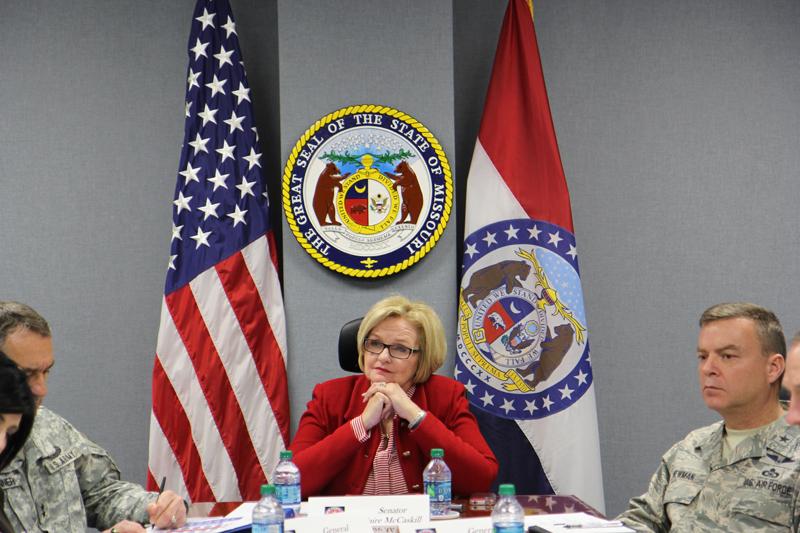Sen. Claire McCaskill, D-Mo., met with Missouri National Guard officials today in Jefferson City to discuss the health and safety of Missouri guardsmen and airmen.
“Those of you who are working on the ground with mental health and sexual assault issues and how we deal with those in a military context, I need your perspective,” McCaskill told the officials. “It is way too easy when you serve on (the Armed Services) Committee in Washington, to only hear from very, very top leadership in various parts of the military.”
Officials briefed McCaskill on sexual assault prevention efforts and the Guard’s mental health programs, but expressed concern that recent National Defense Authorization Acts have forced the military to create new programs without additional funding. To comply with the NDAA’s orders, the military must cut other programs.
“The (Department of Defense) further down will say, ‘oh, you’ve got to do this, but oh, by the way, you have to take it out of hide,’” Adjutant General Stephen Danner said. “So then it comes down to the (state adjutant generals) who have to say, ‘Do I cut my safety programs? Do I cut my environmental programs? What programs do I short-sheet to make room for these new programs?’”
Due to budget cuts, Alternate Sexual Assault Response Coordinator Emmaline Harrington, who attended the meeting, will not have her contract renewed at the end of the month, leaving the Missouri Guard with one full-time SARC to handle cases at the state level.
McCaskill asked the officials to send her information on what health and safety programs the NDAA authorizes that are not being funded so she could try to adjust future NDAAs.
“Help me identify that, and I’m capable of raising a ruckus,” she said.
McCaskill said she hopes the Missouri National Guard’s approach to mental health services can become standard nationwide. The Missouri National Guard had the highest military suicide rate in the nation in 2010, but new collaborative mental health programs have helped the suicide rate become one of the lowest.
“The notion that Missouri has taken all of the programs that impact the health and welfare of the Guard, and put it in one unit where everyone is collaborating … They’ve used that to get at one of the most depressing problems that our military faces, and that is the high incidence of suicide,” McCaskill said. “So I’m very proud of that effort, and I think they can show that to other states as a way of how to do it right.”
McCaskill updated military officials on sexual assault legislation she introduced in the Senate and hopes will be included in next year’s NDAA. The legislation would reform the Uniform Code of Military Justice to prohibit commanders from nullifying jury verdicts and require commanders to provide written justification for commuting or lessening a sentence.
“The sexual assault that has become too common in the military, we have to make sure we go after that with a single-mindedness,” McCaskill said. “If there is a bad actor, whether it be in a reserve unit, a guard or active, they need to be found, they need to be prosecuted and they need to be put in prison.”
Danner said that since the Missouri Guard is not active, it often directs sexual assault cases and other felonies to the local prosecutor instead of following the UCMJ.
“Fortunately, on the sexual assault side, we’ve had very little instances,” Danner said. “But with any other felonies — theft or those kinds of things — we work mostly with the local prosecutors.”
McCaskill said she hopes high-ranking military officials in Washington will shift their focus to the health of their soldiers before arguing over the power of their weapons.
“At the end of the day, if we don’t have strong soldiers and airmen and Marine Corps and all of it, if we don’t have them in a place where they are healthy and ready, all the technology is not going to do much good,” McCaskill said.








